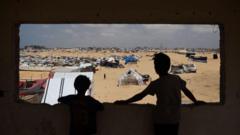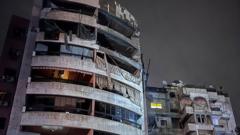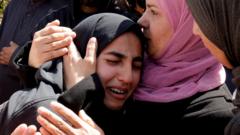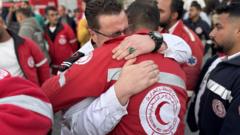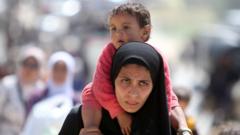Dr. Mark Perlmutter, working in Gaza, reports on the catastrophic medical conditions facing wounded Palestinians, highlighting the challenges of providing care without essential supplies. His observations reflect the broader humanitarian crisis exacerbated by the ongoing conflict.
Gaza Medical Crisis Deepens Amid Ongoing Conflict
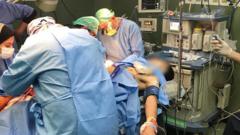
Gaza Medical Crisis Deepens Amid Ongoing Conflict
American surgeon reveals dire conditions in hospitals as injured Palestinians succumb to a lack of medical supplies during renewed Israeli offensives.
An American surgeon providing care in Gaza has described a harrowing situation where wounded Palestinians are dying due to critical shortages of medical supplies and equipment. Dr. Mark Perlmutter, who has recently spent three weeks at two hospitals in the region, emphasized the dire circumstances under which medical personnel are operating. Hospitals have reportedly been functioning without basic necessities such as soap, antibiotics, and x-ray machines, as Israel intensifies its military actions against Hamas.
During his stay, Dr. Perlmutter recounted the story of a 15-year-old girl severely injured by Israeli gunfire while riding her bicycle. He highlighted the tragic reality that many children are caught in the crossfire. The Israeli government has asserted that its military operations are intended to compel Hamas to release hostages but denies any wrongdoing.
Dr. Perlmutter's criticism of the Israeli offensive has been vocal; he previously described it as "genocide" and called for an arms embargo against Israel. This trip marked his second visit to Gaza within a year, as he works under the World Health Organization's initiative via Humanity Auxilium.
While operating in Al-Aqsa hospital in Deir al-Balah and Nasser hospital in southern Gaza, Dr. Perlmutter experienced an Israeli airstrike targeting a Hamas leader being treated at Nasser. He argued that, as a hospitalized patient, the leader should have been protected under the Geneva Convention, reflecting the complexities of warfare in civilian settings.
The impact of the ongoing conflict is starkly illustrated by the cases of two teenagers treated in the hospitals. Both sustained catastrophic injuries from military engagements, with Dr. Perlmutter describing the gruesome reality of their wounds and the potential for survival being exceedingly slim due to insufficient medical care.
The Israel Defense Forces (IDF) continue to assert that they do not target civilians, but Dr. Perlmutter's accounts have sparked significant concern and criticism regarding the ethical implications of military actions in densely populated areas.
As Israel maintains a blockade, cutting off humanitarian supplies since early March, Dr. Perlmutter highlights the incredible dedication of Palestinian medical personnel who continue to work under extreme stress, often without compensation. He compared their efforts to those of medical staff in his home state of North Carolina, emphasizing the overwhelming burden on Gaza's healthcare system amidst the current crisis.
Across Gaza, many hospitals struggle to operate or have ceased functions entirely, with local medical staff working tirelessly to address the influx of casualties created by the resurgence of violence. UN humanitarian officials have labeled the situation as dire, with aid stuck and unusable within closed borders.
Dr. Perlmutter warns that the ongoing violence will only exacerbate the already critical medical crisis in Gaza, leading to further preventable deaths among those who can be treated if sufficient resources were available. As UNICEF reports rising casualties, international calls for effective humanitarian intervention continue in the face of escalating tensions and violence in the region.


